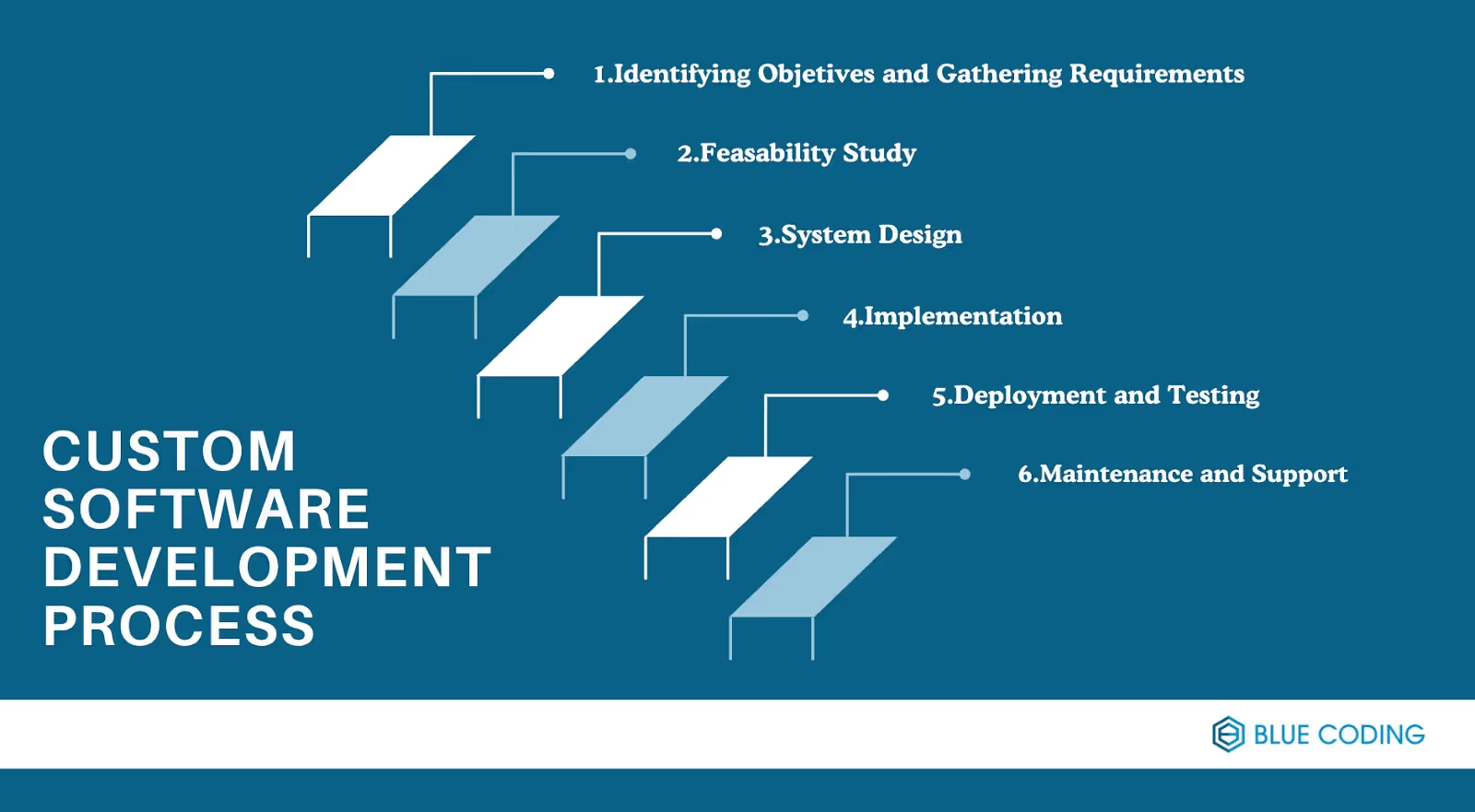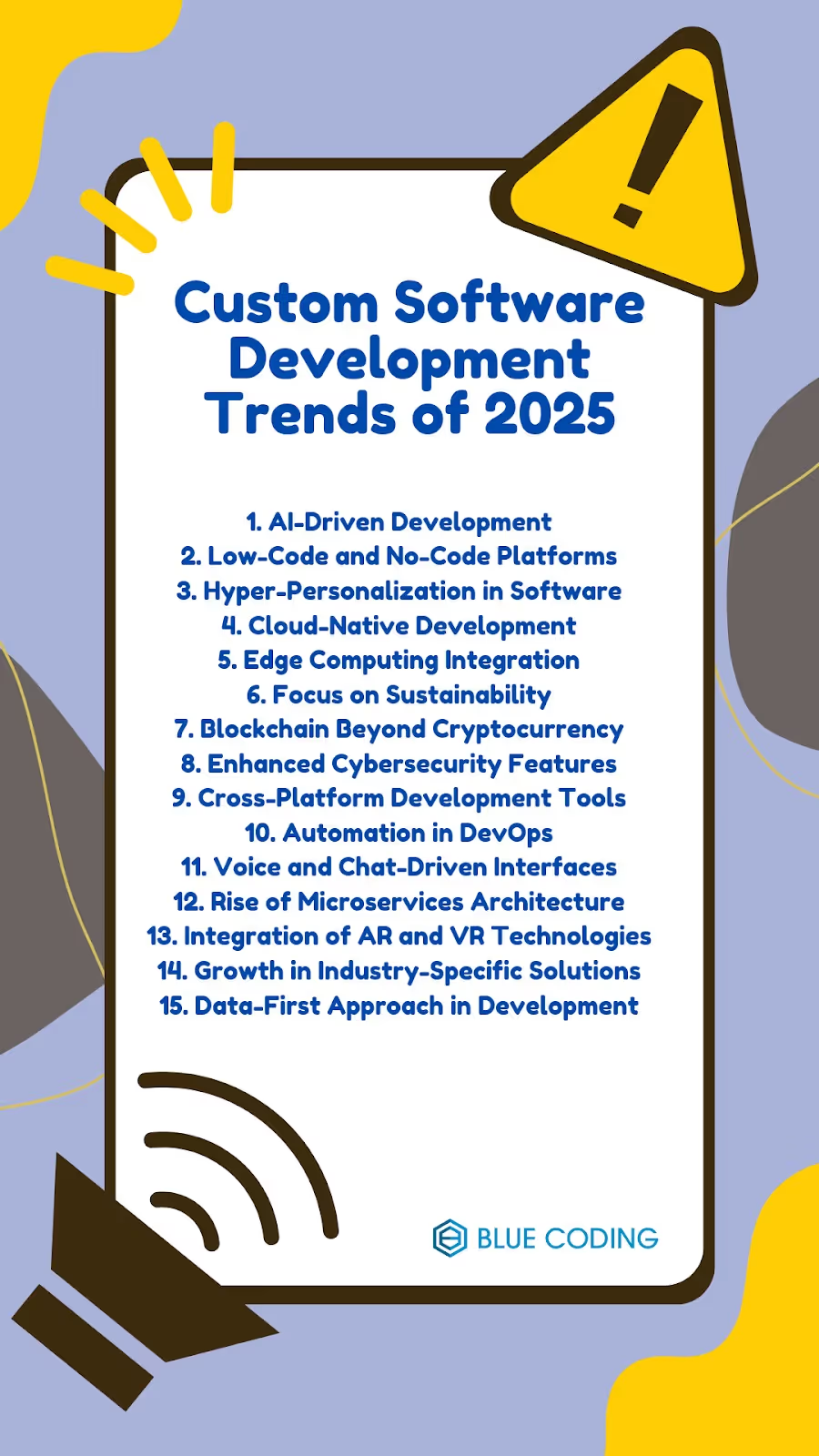Custom software development has constantly been on the edge of changing every now and then, bringing fresh trends that shape how businesses create and use software. Custom software development in 2025 will focus on innovation, user experience, and adaptability. Businesses embracing these trends will benefit from streamlined processes, improved customer satisfaction, and sustainable growth. Below is a detailed look at the top trends expected to define custom software development in 2025.

Custom software development is the process of creating software that is specifically designed to meet the unique needs of a business or individual. Unlike off-the-shelf software, which is built for general purposes and used by many people, custom software is tailor-made for specific tasks, workflows, or goals. This means it can be adapted to solve problems or handle requirements that standard software cannot address effectively.
The process usually starts with understanding the client’s needs in detail. Developers work closely with the client to define the features, functionalities, and overall purpose of the software. After planning and designing, the software is coded, tested, and deployed to ensure it works perfectly for the intended use.
Custom software can take many forms, such as mobile apps, web applications, or enterprise systems. It is often used in industries like healthcare, retail, finance, and manufacturing, where specialized tools are essential to manage operations. For example, a retail business might need software to track inventory and manage customer loyalty programs, while a healthcare provider might require a system to store patient records securely.

Artificial intelligence (AI) is no longer a futuristic idea; it’s a vital tool in software development. In 2025, AI will play a larger role in automating coding tasks, debugging, and optimizing workflows.
AI’s influence will not only increase efficiency but also reduce costs, making it a must-have for software projects.
The rise of low-code and no-code platforms is democratizing software development. These tools allow non-technical users to create apps without writing complex code.
This trend will make software development accessible to a wider range of professionals, fostering innovation across industries.
Modern users expect personalized experiences. In 2025, custom software development best practices will prioritize hyper-personalization using data analytics and AI.
Hyper-personalization will help businesses engage users more effectively, increasing customer loyalty.
Cloud computing has become the backbone of modern software. In 2025, cloud-native development will dominate, allowing developers to build scalable and flexible applications.
This approach ensures that software remains accessible, secure, and cost-effective for businesses of all sizes.
As IoT devices grow, edge computing will emerge as a key trend. Instead of relying solely on centralized data centers, custom software will process data closer to where it’s generated.
Developers will increasingly design applications with edge computing in mind to meet user expectations for speed and reliability.
Environmental concerns are driving the shift toward sustainable software development. By 2025, businesses will prioritize eco-friendly practices in their projects.
Sustainability will not only benefit the environment but also attract environmentally conscious customers.
While blockchain is widely known for cryptocurrency, its potential in software development is far greater. In 2025, blockchain will be used for various custom software applications.
Blockchain’s secure and transparent nature makes it ideal for custom software in sectors requiring trust and data integrity.
With the increasing number of cyberattacks, security will remain a top priority in 2025. Custom software will integrate advanced security features to protect users and data.
Cybersecurity features will no longer be optional; they will be a core aspect of all custom software projects.
The demand for apps that run seamlessly across devices is growing. In 2025, cross-platform development will be a key trend, driven by tools like Flutter and React Native.
Cross-platform tools will continue to simplify the development process without compromising quality.
DevOps practices are essential for modern software projects, and automation will further enhance these practices in 2025.
By automating repetitive tasks, developers can focus on delivering high-quality software faster.
The popularity of virtual assistants and chatbots will influence custom software development in 2025.
Voice and chat-driven interfaces will make software more user-friendly and inclusive.
Microservices architecture breaks down applications into smaller, independent components. This design will dominate custom software development in 2025.
Microservices will provide the flexibility businesses need to adapt to changing demands.
Augmented reality (AR) and virtual reality (VR) will continue transforming industries like gaming, education, and healthcare. In 2025, custom software will leverage AR and VR for immersive experiences.
As AR and VR tools become more affordable, their applications will expand further.
Generic solutions are no longer enough for many businesses. Custom software in 2025 will focus on industry-specific needs.
Tailored solutions will give businesses a competitive edge by addressing their unique challenges.
Data is a valuable asset, and custom software development will revolve around data management in 2025.
This trend ensures that businesses can make smarter decisions and stay ahead of their competitors.
Welcome to Blue Coding! We are a nearshore outsourcing agency that specializes in connecting remote developers with clients from all over the USA. Our team of developers benefit from the work from home environment while also having a rich connection with their team members. As our developers are aware of the top custom software development tips we are able to manage projects easily and within the deadline.
If you're a software developer that wishes to work from home, we would love to have you on our team. Check out our open vacancies and apply for the one that fits your set of skills the best.
Subscribe to our blog and get the latest articles, insights, and industry updates delivered straight to your inbox